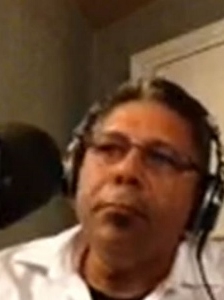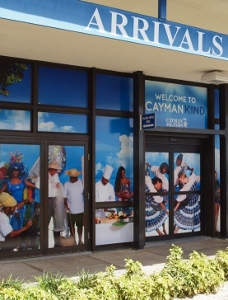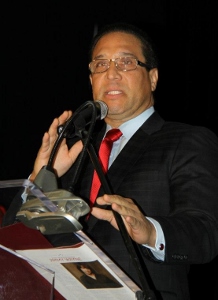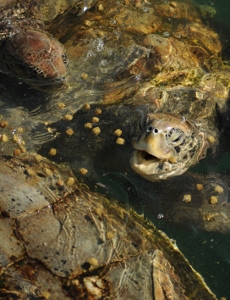Archive for January, 2014
West Bay men deny killing Swiss banker
(CNS): Two men who were charged last year in a cold case killing have denied murdering Frederic Bise whose body was found in the trunk of a burnt out car in the district of West Bay in February 2008. Chad Anglin and Leonard Ebanks (left) both pleaded not guilty to the murder charge when they appeared in Grand Court on Friday morning. The men were remanded in custody and a trial date has been pencilled in for May of this year. Police charged the two West Bay men in October some five and a half years after the killing following a two year investigation by the cold case squad which was formed in 2010.
The 40-year-old Swiss banker’s beaten body was found in the boot of his own a burned car outside his home in Mount Pleasant in February 2008. This was the first case selected and solved by the unit as officers believed that there were leads in the case that could be progressed.

Cap row leads to jail time for WB man
(CNS): A West Bay man was found guilty last week of shooting at a neighbour over a missing cap by a visiting judge, who presided over the case without a jury. Convicted of possession of an imitation firearm with intent, common assault and threats to kill in relation to an incident last August, Shane Bodden will be looking at jail time but he has escaped the mandatory minimum ten years for possession of an unlicensed firearm. Although Justice Carol Beswick was convinced by the evidence of the complainant that he was shot at by Bodden, neither the weapon nor any bullets were ever recovered and his victim received only a scratch, leaving no evidence that what Bodden used was a lethal, working gun.
Bodden had denied the charges, saying he was not there at the time. Although he chose not to take the stand on his own behalf, his long-time girlfriend appeared as a defence witness and testified that he was with her and their children on the night in question.
Nevertheless, the judge said that she was not convinced by that evidence, coming as it did from someone who admitted to being his common law wife for some eleven years and who denied discussing the matter with her boyfriend, which the judge found difficult to believe.
The judge noted that the witness was awaiting sentencing herself, having recently been convicted of forgery related offences. Although she has never been convicted of perjury, when the issue of her dishonesty was raised during cross examination, the judge stated that the witness’ demeanour changed considerably and concluded in her verdict that she was not a forthright witness.
The judge said the complainant, Joseph Ebanks, was still “coherent and clear” when he gave his evidence, despite admitting to having some drug and alcohol problems in the past and that he had consumed a little beer, ganja and some cocaine earlier on the day that he was shot at. In her verdict Justice Beswick accepted his evidence as truthful. She said the evidence satisfied her “so that she was sure of unlawful violence and hostile intent” in the altercation between the two men which resulted in Bodden producing a firearm and shooting at Ebanks.
The incident had taken place at an unoccupied house in West Bay that belonged to Ebanks' father, who is now unable to get about and is living at another location nearby.
However, as a family property, Ebanks said he would check the house when he went to visit his father as he believed people had been breaking in. On the night in question he found Bodden on the premises at about 8pm, having apparently broken the padlock to get inside. Although he left after an argument, Bodden later returned to the property. When Ebanks was making a final check, as he was planning to leave he encountered Bodden again.
According to Ebanks, Bodden accused him of stealing his cap and despite his denials and protestations, Bodden threatened to shoot him if he did not return it. Declaring that he was prepared to shoot him, Ebanks said Bodden pulled out a black gun and fired at him. Having ducked and turned however, whatever was fired from the weapon skimmed Ebanks’ shoulder, leaving a small graze.

Fuel quality probed
 (CNS): Following complaints and concerns from consumers that some of the fuel sold at local stations is well below acceptable standards of quality, the Cayman Islands’ Chief Petroleum Inspector (CPI) undertook a report and has identified some problems withthe quality of diesel. A release from Government Information Services said that the fuel inspector has pointed to the need for some new measures and regulations as well as a formal complaints procedure as a result of his findings during the assessment undertaken at the end of last year. CNS has requested a copy of the report, which has not yet been released as officials stated it remains in draft form.
(CNS): Following complaints and concerns from consumers that some of the fuel sold at local stations is well below acceptable standards of quality, the Cayman Islands’ Chief Petroleum Inspector (CPI) undertook a report and has identified some problems withthe quality of diesel. A release from Government Information Services said that the fuel inspector has pointed to the need for some new measures and regulations as well as a formal complaints procedure as a result of his findings during the assessment undertaken at the end of last year. CNS has requested a copy of the report, which has not yet been released as officials stated it remains in draft form.
Although the inspector, Duke Munroe, has made a number of recommendations to better monitor and ensure local gas quality, the problems encountered during the review have not yet been fully detailed.
The report, entitled "Investigation into Quality Issues of Gasoline Distributed in Cayman Islands Retail Network", took place late last year following another surge of complaints from consumers that their vehicles were being impacted by bad fuel and drivers reporting mechanical problems that appeared to be linked to gasoline quality.
According to officials, the quality of the fuel analysed was found to be generally acceptable. It was analysed by Certified Labs in the USA, which indicated that the baseline parameter of local fuel meets standard test criteria. The few cases where fuel quality issues were found, in particular issues regarding some underground tanks, the product of concern was diesel – not gasoline.
Officials said measures had been taken to address those issues but additional work was needed in this area.
“While the industry’s Octane Index was found to be acceptable for the fuels tested, any possibly compromised fuel would likely have been depleted at the time of the investigation. The fact that many drivers use different retail locations and often different companies was a factor which influenced the exercise," officials stated. “Of the parameters analysed, the levels of existent gum were found to be somewhat abnormal. Yet, based on available information, the level of 'gum' detected was not suspected to be the cause of vehicular issues.”
However, even though experts thought that the symptoms did not directly correlate with issues related to this parameter, the possibility could not be ruled out.
“Because of its likely effects, efforts continue to further review this topic as part of comprehensive solution to the problem,” GIS said of the 24-page report documents. Mild anomalies in fuel colour were also flagged for further observation and review.
Munroe said tank maintenance, technical issues and inventory management practices would continue to be scrutinized in order to determine if there were other underlying issues.
The CPI reportedly found that the shortcomings the office turned up were “manageable” but improvements were needed in the area of information-sharing between the fuel industry, government and the public, as it seems he struggled to get the information he needed.
"In many cases, basic non-proprietary information was difficult to obtain … which can only be addressed by well-defined regulations,” Munroe said. “Despite some limitations, the exercise produced useful findings and valuable data/information which is essential for renewed discussion in the area of fuel quality, and ultimately to develop a framework to address this issue, going forward,” he added.
The CPI has also proposed establishing a committee to develop and periodically review quality standards for imported fuel. New regulations and fast-tracking of policies to ensure quality and to allow effective monitoring and enforcement of industry standards are among other key recommendations made.
The draft report with findings was presented to government in November and officials said it was being reviewed. Copies were shared with the oil companies, who cooperated with the CPI during the investigation but copies have not yet been provided to the media.

Two tasered in Brac bar fight
(CNS): Two female police officers broke up a bar fight just after midnight Saturday morning and in the process tasered two men said to be obstructing them. Police say that the officers, who were on police patrol, went to La Esperanza bar, Watering Place, after a report of afight at 12:01am on 25 January. A large crowd had gathered around two men who were in heated argument, police said. The officers intervened but two other men who tried to stop them were tasered. Three men between the ages of 25 and 39 were arrested for several criminal offences, ranging from assault, ABH, resisting arrest and interfering with a police officer in the execution of his duties. Unofficial sources say that there were several fights in progress and the situation was getting out of control.
One man was taken to the Faith Hospital on Cayman Brac for medical treatment for non-life threatening injuries he sustained allegedly as a result of being assaulted by one of the men, police stated. Unofficial sources told CNS that his arm was severely broken and he later flew to Grand Cayman on a regular flight for further treatment.
It is also undersood that another man was stabbed three times during the fight, to his hand, his arm and his body, but the wounds are not life threatening.
Cayman Brac police are urging people who may have information relative to this incident to call the Brac police station at 948-0331 or Crime Stoppers at 800(TIPS) 8477.

Chamber calls on employers to step up
 (CNS Business): With local businesses complaining bitterly about the cost of work permit fees and the negative impact that such high numbers of unemployed locals is having on the community, the Cayman Islands Chamber of Commerce president is asking employers to step up and start being part of the solution. Johann Moxam asked local business owners and industry managers what they are doing to prepare young Caymanian students to enter the workforce or generate interest in their industry sector or business and he urged those doing nothing to consider participating in this year's Careers, Education and Training Expo at the University College of the Cayman Islands in March. Read more on CNS Business
(CNS Business): With local businesses complaining bitterly about the cost of work permit fees and the negative impact that such high numbers of unemployed locals is having on the community, the Cayman Islands Chamber of Commerce president is asking employers to step up and start being part of the solution. Johann Moxam asked local business owners and industry managers what they are doing to prepare young Caymanian students to enter the workforce or generate interest in their industry sector or business and he urged those doing nothing to consider participating in this year's Careers, Education and Training Expo at the University College of the Cayman Islands in March. Read more on CNS Business

Joey comes clean over theft
 (CNS): In a surprise turnaround following his recent clams of innocence, Joey Ebanks has changed his pleas and has admitted to 17 counts of theft, forgery, fraud and deception relating to his time as the managing director of the Electricity Regulatory Authority. Between September 2012 and March 2013, he is said to have stolen around $100,000 from the authority, including spending more than $67,000 on iPads and iPhones. Ebanks, who stood as a political candidate in the North Side race as an independent in the 2013 election and as a PPM candidate in the 2009 election in the same district, had claimed the allegations were part of a conspiracy against him. Following a campaign protesting his innocence on Facebook for almost a year, Ebanks stood in the Grand Court dock Friday and came clean.
(CNS): In a surprise turnaround following his recent clams of innocence, Joey Ebanks has changed his pleas and has admitted to 17 counts of theft, forgery, fraud and deception relating to his time as the managing director of the Electricity Regulatory Authority. Between September 2012 and March 2013, he is said to have stolen around $100,000 from the authority, including spending more than $67,000 on iPads and iPhones. Ebanks, who stood as a political candidate in the North Side race as an independent in the 2013 election and as a PPM candidate in the 2009 election in the same district, had claimed the allegations were part of a conspiracy against him. Following a campaign protesting his innocence on Facebook for almost a year, Ebanks stood in the Grand Court dock Friday and came clean.
The June trial date that had been set relating to his previous not guilty pleas was vacated and a sentencing hearing fixed for 13 March. Defense attorney Ben Tonner requested a social enquiry report before the hearing and for his client's bail to continue. With no objections from the crown, Ebanks, who will be facing a custodial sentence, was bailed to return for sentencing.
Ebanks is also facing charges in Summary Court for theft and drug related offences. In addition, the police recently announced that Ebanks was under investigation relating to a solar panel project Ebanks attempted to launch while working at the ERA.
A former talk show host, Ebanks is no stranger to controversy. When he was the managing director of the Cayman Turtle Farm, he was at the centre of a controversial report by the Office of the Auditor General, as well as running up a significant bar bill and taking what appeared to be unauthorized salary advances of some $40,000. That cash was paid back, however, when he resigned in order to run for office with the PPM in 2009.

SAGCs in even worse state
 (CNS): Statutory authorities and government companies (SAGCs) cost the Cayman taxpayer over $100 million every year but the auditor general has found a complete lack of accountability in most of them, which appear to be failing on the good governance front even more than core government. Pointing to poor standards of governance amongst the semi-autonomous public bodies, with none of them properly accounting for what they do, Alastair Swarbrick said the SAGCs are failing to tell the story of how they spend public money or how they are achieving government aims and objectives.
(CNS): Statutory authorities and government companies (SAGCs) cost the Cayman taxpayer over $100 million every year but the auditor general has found a complete lack of accountability in most of them, which appear to be failing on the good governance front even more than core government. Pointing to poor standards of governance amongst the semi-autonomous public bodies, with none of them properly accounting for what they do, Alastair Swarbrick said the SAGCs are failing to tell the story of how they spend public money or how they are achieving government aims and objectives.
Employing 38% of public sector workers, the 26 entities account for around $300 million of expenditure and bring in around $200 million of revenue. They also deliver a significant number of government services, from health to connecting the islands.
As part of a recent assessment and audit of good governance in central government, the Office of the Auditor General (OAG) also looked separately at the issues relating to statutory authorities and government companies. The team undertook a survey, which was sent to 25 public authorities, consisting of 36 questions relating to principles of good governance. While 17 of the authorities responded to the public auditor, eight made no attempt to fill in the survey to assist the office.
Cayman Airways, which receives a considerable subsidy from government every year, the Cayman Islands Development Bank, the Children Youth And Services Foundation, The Civil Aviation Authority, The National Drug Council, The National Housing Development Trust, as well as the Sister Islands Affordable Housing Initiative and the University College Of The Cayman Islands failed to answer the auditor’s questions.
From those that responded, the auditor general found a variety of practices across the entities relating to how they are governed which gave him serious cause for concern.
“Many of the practices we found were not acceptable. The good governance of these organisations are in some cases are contrary to such laws as the anti-corruption legislation in place,” Swarbrick said.
While his office was already well aware of the problems as a result of the financial audits it has undertaken, this report reinforced that understanding of what he said were “poor practices and the extent of effort required for improvements to be implemented".
Swarbrick also raised concerns about the lack of response from the eight, despite considerable follow-up action by his office.
“This in itself indicates to me a considerable issue with regard to entities supporting the concepts of good governance and doing what they need to ensure they have good practices employed in their entities,” the auditor general said in his conclusion.
He warned that his office would be returning for further audits in specific organisations to “determine the extent to which the poor governance practices have led to poor performance and lack of due diligence with respect to the management of public resources.”
In his substantial report Swarbrick said the framework in the Public Management and Finance Law (PMFL) for SAGCs to report to government was not working, so there was no accountability and few assurances that the public authorities were working effectively or achieving any of government’s objectives.
He said that in many cases results were not clearly stated and, as with the problem in core government, these entities are focused on activities, not goals or how they are achieving value for the money they get from the public purse. Pointing to confusion over roles as well as their continued failure to produce timely or accurate financial accounts, how they achieve value for money is completely absent in most cases.
All organisations that spend public money have to strive for economy efficiency and effectiveness in their work, Swarbrick noted but said, “We did not observe one situation where an SAGC established how it had achieved value for money in its operations.”
The auditor general found a policy void from core government with regards to direction, which he said had led to uncertainty, and while these entities are meant to have some autonomy, government appears to have lost control of them.
In his response to the problems surroundingSAGCs Premier Alden McLaughlin said that they had been difficult for government to rein in. He spoke about the pay freeze implemented across the civil service which was largely ignored by the SAGCs and said that some of the CEOs were earning far more than the governor, the deputy governor or himself. He indicated that in some cases where the creation of a government company or authority has failed to do what It was originally created to do, government would be considering taking back the services into core government.
Even though CEOs are getting top dollar in these companies, Swarbrick’s report highlighted many failures as well as confusion of roles between the ministries and their staff’s responsibilities with the boards and CEOs of the SAGCs.
“There is an incomplete understanding about how good governance framework is supposed to work in the SAGCs,” he said
While chief officers are supposed to be responsible for monitoring the relevant SAGCs in their ministries, because government isn’t setting clear directives or policy goals for them there are no clear results expectations.
Ironically, the audit office found that the Cayman Turtle Farm, which gets the largest subsidy from government and is one of its most troublesome authorities, was the only government company to identify what it was really for and had performance targets.
Outlining his concerns, Swarbrick said that good governance provides a roadmap for how a country is governed, including its economic policies and regulatory framework, as well as adherence to the rule of law.
“In my reports, I talk about how the lack of good governance can lead to corruption and the abuse of public authority or trust, for private benefit. As we all know, corruption undermines the public’s trust in its government. It also threatens market integrity, distorts competition, and endangers economic development,” Swarbrick warned.
With myriad problems at the SAGCs, the auditor noted it was government that had to address the significant gaps between what is expected and the current reality.
“With 26 entities reporting to core government and a sizable part of how government delivers services to residents, SAGCs need to be accountable for their results. We found that Government has yet to implement an effective means to hold these entities to account,” he said.
“We identified many practices which were weak and did not reflect reasonable governance practices for these types of entities, leading to increased risks,” Swarbrick added and emphasised that SAGCs are simply not achieving the results and outcomes that should be expected of them.
Check back to CNS for more on the missing ethics, values and conflicts of interest in government found by the OAG.

12 get jobs in tourism drive
 (CNS): The push to get local people placed in tourism sector jobs seems to have encountered a few hurdles. According to a release from the Cayman Islands Tourism Association (CITA), although officials avoided being direct about the details, CITA indicated that they faced various challenges during the Tourism Employment Drive (TED), which took place in October and November. Just twelve people have secured work as a result of the efforts, which is far short of the 200 positions that were targeted at the beginning of the initiative. CITA said that it would nevertheless be continuing with the drive this year, having learned some undisclosed lessons during the first attempt.
(CNS): The push to get local people placed in tourism sector jobs seems to have encountered a few hurdles. According to a release from the Cayman Islands Tourism Association (CITA), although officials avoided being direct about the details, CITA indicated that they faced various challenges during the Tourism Employment Drive (TED), which took place in October and November. Just twelve people have secured work as a result of the efforts, which is far short of the 200 positions that were targeted at the beginning of the initiative. CITA said that it would nevertheless be continuing with the drive this year, having learned some undisclosed lessons during the first attempt.
CITA said more than 120 individuals met with industry professionals and received training packages. A third of those, or around 40 individuals, went on to interview at tourism businesses, and around 10% of the original group of 120 were placed in jobs and are now working, it added. Officials from the association also stated that interview referrals and follow-ups to both prospective employers and employees are ongoing, and as a result more candidates are expected to be starting jobs before the end of this month.
The public private partnership campaign consisted of a five-district road show through Grand Cayman at which attendees registered with the National Workforce Development Agency received referrals for job interviews and skills training.
“The TED programme has helped us address practical challenges of connecting job seekers to the opportunities in the tourism industry,” said Lois Kellyman, Manager for Employment Services at NWDA, which partnered with CITA on the drive. “We look forward to working with Cayman Islands Tourism Association on more employment drives and calling on the tourism association as a resource in our ongoing job placement initiatives.”
However, according to the CITA President Ken Hydes, the initiative, in which he said people from the industry spent many hours, appears to have presented some difficulties.
“Decision makers in the tourism industry dedicated hundreds of hours to the TED programme, literally going district to district to meet with people,” Hydes said. “As with any new programme, this one had a few challenges. We are refining the processes and are encouraged by our results so far. With strong support from government and a commitment to an annual drive and ongoing follow ups, the tourism industry has a systematic plan to draw more Caymanians into our business.”
Officials said that leaders from the tourism industry have since met with government “to discuss the lessons learnt from the Tourism Employment Drive (TED)”.
Organizers said that it had been quickly realized that there were “opportunities to facilitate training”, as it seemed candidates were not necessarily prepared for the jobs available. However, both CITA and government officials have avoided addressing what lessons were learned and what the challenges were.
There was no indication if the very low number of placements was down to the lack of skills in candidates or other issues, if the sector did not have as many openings as anticipated, or if the candidates were not happy with the pay and conditions on offer.
Although there were only twelve placements, falling far short of the goal of getting 200 local workers into tourism, Employment Minister Tara Rivers was supportive of the initiative.
“This long-term partnership has real potential to create change and to ensure that Caymanians have opportunities to be active participants in the growing tourism labour market,” she said. “In addition to providing employment opportunities the focus of the partnership is on human capital training and development which is critical for successful employment and career advancement in the industry.”
The TED initiative was led by business owners and senior leaders in the tourism industry, notably Janette Goodman of The Ritz-Carlton, Grand Cayman, Steven Hayes of Tropical Trader Restaurant Group and Markus Mueri of NM Ventures. Both Stepping Stones and CITA staff supported the ongoing data collection and follow-ups to help facilitate interview referrals.

Press briefings ‘pot shots’ at government, says Alden
 (CNS): The regular TV press briefings originally instigated by the former PPM administration, adopted and dropped by the McKeeva Bush led UDP government and then reinstated by the minority Cabinet last year will not be returning. Once a staunch advocate of the briefings, Premier Alden McLaughlin said his government would answer any press enquiries when they were made but he did not see a need to re-establish weekly briefings just so the media could take "pot shots at government". Although the PPM had said it would hold regular briefings, if not necessarily on a weekly basis, since coming to office the ministers have held only specific calls, where the media have been directed to ask only relevant questions to the press briefing topic.
(CNS): The regular TV press briefings originally instigated by the former PPM administration, adopted and dropped by the McKeeva Bush led UDP government and then reinstated by the minority Cabinet last year will not be returning. Once a staunch advocate of the briefings, Premier Alden McLaughlin said his government would answer any press enquiries when they were made but he did not see a need to re-establish weekly briefings just so the media could take "pot shots at government". Although the PPM had said it would hold regular briefings, if not necessarily on a weekly basis, since coming to office the ministers have held only specific calls, where the media have been directed to ask only relevant questions to the press briefing topic.
On Wednesday, however, when the premier appeared alongside the deputy governor to talk about and answer questions regarding the auditor general’s latest reports on the shortcomings of governance, CNS asked the premier if press briefings would be returning and for answers to a number of unanswered questions that have been submitted over the last few months.
McLaughlin dismissed the need for regular briefings.
“If the media has questions, let us have them. I am not prepared to engage in a back and forth and let the media take pot shots at us,” he said.
When pressed, he gave short answers to some of the questions that CNS has submitted, including details on the government’s plans for one man, one vote and the state of the Dart talks, but the premier made it clear that there was little he could say on the subjects, which was why the questions had not been answered.
During the election campaign the PPM had highlighted their introduction of weekly briefings as a positive factor in their preference for open and transparent government. They were held, the party said, to advise the media and country of government actions and activities.
“One of the first changes the PPM government introduced was a weekly press briefing at which journalists could ask what they wanted,” the party manifesto from the 2013 campaign states.
Although the current premier has not resorted to televised national statements since taking office, an issue he criticised the former premier over, he has utilized his press secretary to send out statements to the media on issues such as the immigration changes and other key policy decisions. In such cases, the media then has to chase the premier, other relevant ministers or senior civil servants regarding any questions arising.
Disappointed about the position taken over communicating with the media, CNS reporter, Wendy Ledger, said, "Everyone in the local press appreciates that government ministersare busy and feeding the ever-hungry news beast is not a priority for them.
“But getting questions answered in a timely fashion is never easy so we end up calling and pestering busy politicians for answers,” she said, adding that while some government ministers and officials are very quick and helpful answering enquiries, on some of the more sticky issues government has been less forthcoming.
“It may not be their priority to answer us but it’s our job to press,” said Ledger. “With a regular briefing we can ask all the questions and raise all the topical queries at one time when we know we will be meeting with government ministers. This is an advantage for them, too, as it means they won’t be fielding calls and emails all the time when they are busy.
“It avoids us all constantly, as individual reporters, often asking very similar questions and the same ministers then having to repeat the answers. It would also prevent us from having to resort to the tired lines saying we have contacted the relevant minister or official but don’t have a response when we run reports on issues of public interest and concern,” she added.
Ben Meade, the news director Cayman 27, also had some concerns. He said that the team’s reporters have not had a problem with access to the premier and some of his cabinet ministers but he was hoping that McLaughlin would reconsider his position.
“I trust that this will continue despite his recent position on the press briefings. However, I find it unfortunate that the premier sees it fit to view press briefings as an opportunity for members of the press to 'take pot shots' at him. Part of our role in the media is to hold public officials, elected and otherwise, accountable on behalf of the Cayman public. Regular press briefings provide a great avenue for this and I hope he seriously reconsiders his position on this matter," he told CNS.

UK to fund turtle survey
 (CNS): Experts from the Department of Environment (DoE) have received funding from the UK’s Darwin Project to conduct research on how much turtle meat is being consumed locally and to look at the impact of the Cayman Turtle Farm’s release programme on the wild population. The DoE will look at how many of the wild turtles nesting here were originally from the farm and other data. Following meetings with the World Society for the Protection of Animals (WSPA) and government this month, officials said talks had been positive, with the charity accepting the cultural significance of turtle to Cayman while government accepted the need to stop promoting meat to visitors and rethink releasing farmed turtles into the wild.
(CNS): Experts from the Department of Environment (DoE) have received funding from the UK’s Darwin Project to conduct research on how much turtle meat is being consumed locally and to look at the impact of the Cayman Turtle Farm’s release programme on the wild population. The DoE will look at how many of the wild turtles nesting here were originally from the farm and other data. Following meetings with the World Society for the Protection of Animals (WSPA) and government this month, officials said talks had been positive, with the charity accepting the cultural significance of turtle to Cayman while government accepted the need to stop promoting meat to visitors and rethink releasing farmed turtles into the wild.
“These concerns will be investigated further through research conducted by the Department of Environment and their project partners via Darwin Plus funding made available by the UK Government,” the Cayman government said in a joint release with the WSPA, which has spent the last two years campaigning to transition the Cayman Turtle Farm (CTF) into a real conservation research centre.
Following a more cordial meeting with the new administration and WSPA than in the past, the government agreed to address all the appropriate concerns that have been raised by the charity about the conditions at the farm as well as to undertake the research.
“This long-term study will also look into the effectiveness of the turtle-release programme and potential contribution of releases to wild populations of turtles,” it said. The WSPA said it was pleased to learn that the future release of farm-raised turtles has been suspended until the findings of the research are available.
The announcement of the research and the funding follows concerns raised by a report from the UK parliament’s Environmental Audit Committee on Sustainability in the UK Overseas Territories, which specifically pointed to issues at the Cayman Turtle Farm. The committee visited the public section as well as its behind-the-scenes turtle breeding operations and found discrepancies surrounding the farm’s claims in relation to demand in Cayman for turtle meat.
“There remains some dispute whether the Cayman Turtle Farm is creating an artificial market in the tourist industry by encouraging visitors to eat a meat that the majority of indigenous people now shun,” the report noted. The farm has argued that wild turtles would be poached were it not for the farmed turtles it raises but the 25% price reduction last year raises questions about the real level of demand.
The committee also found that the cost of the government-owned company and the almost $10 million annual subsidy from the public purse, an amount four times greater than the annual budget of the Department of Environment and 20 times greater than funding for the Cayman Islands National Trust, was of significant concern to the environmental committee. The committee also drew attention in the report to the August 2012 incident when over 300 green turtles at the CTF were killed after a leak from a seawater pipe left them to dry out without water in a holding container.
Committee members also witnessed several large wild turtles trying to swim from the sea up the sewage outflow channel from the farm when they visited.
“It is conceivable that those were female turtles which had been released from the farm and which were following their natural instinct to return to where they were hatched to lay their eggs,” they observed in the report and welcomed WSPA’s proposal to transition the farm to a wildlife rehabilitation and rescue facility.
“We are pleased that the UK Environment Audit Committee has brought further attention to the extensive ongoing problems at the Cayman Turtle Farm, including its significant drain on the public purse, considerable animal welfare problems, and creation of an international market for turtle meat, which is stoking demand that would not otherwise exist for an endangered species,” said Dr Neil D’ Cruze, WSPA Head of Wildlife Policy and Research, when he arrived in Cayman recently.
However, following the constructive talks with the DoE and other government officials, he said the charity was delighted that funding had been secured to investigate the true level of demand for turtle meat and the impact of releasing farmed turtles.
“It is clear that the information generated by this study will greatly inform effective decision making regarding the long-term future of the farm, including the possibility of its transition into a rehabilitation and release facility,” Dr D’Cruze added. “We also applaud the Cayman Islands Government for working with us in such a positive manner to identify critical short-term steps that can be taken to help alleviate the immediate animal welfare concerns at the farm.”
The charity is particularly pleased that there will be no more turtle releases from the farm until the conclusions of this study are made available and that various stakeholders will explore how to limit the promotion of sea turtle meat to visiting international tourists.
The facility is the last remaining sea turtle farm in the world, with over 9,500 endangered green sea turtles currently held there, having been bred to meet what is now a questionable demand. The WSPA said it believes the farm has lost its original sense of purpose and is now seriously undermining the health and welfare of sea turtles farmed on its premises.